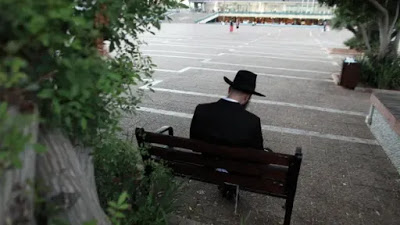Another Israel: The Rosh Hashanah of my childhood
 |
| Gideon Levy 29/09/2019 |
On the eve of Rosh Hashanah and Yom Kippur we would go to the Meisels – Netka and Josef – my grandfather’s childhood friends. They lived on Shlomo Hamelech Street, and from their apartment you could see the religious girls’ school that became a synagogue on the holidays. We would sit on the narrow balcony and watch from a distance; the shofar terrified me.
My father wouldn’t come. He detested religion and knew nothing about the Jewish holidays, even though his father headed the community in his city. He arrived in Palestine illegally – in Israel 2019 they would call him an infiltrator. Back then, they called them clandestine immigrants and their infiltration was called Aliyah Bet, illegal because they were Jews who had fled Europe.
At the train station in Prague he said goodbye to his parents and his fiancée, whom he would never see again. He spent five months at sea on an illegal immigrants’ ship (which today would be called a refugee ship), including detention in Beirut, in a facility that in Israel they would call “Holot” – the detention center for African asylum seekers. In Herzliya the young doctor of jurisprudence went door to door by bicycle to sell yeast cakes that he and his sister had baked.
Before Rosh Hashanah you had to come to school wearing blue and white, the national colors. At Eckman’s department store on Dizengoff Square they sold New Year’s cards decorated with glitter, with pictures of soldiers and farmers. Near the store’s front door, leaning on a tree that’s still there, leaned an amputee beggar into whose hand my grandfather always pushed a coin.
I was afraid of him, as I was afraid of all the street people back then, most of them Holocaust survivors who had lost their minds. On the steps of the Zamenhof Street post office, near the Esther Cinema, a big man who wore black, the first homeless person, would spread out his belongings every evening.
Behind the post office was Mira’s lending library. My library card number was 7154, and this I write as someone who doesn’t remember his sons’ phone numbers. Zahara would recommend books and write them down on the card, with Mira and her husband Nathan in the background.
The walls of the buildings on Zamenhof Street, along which I would hurry home to read the book that Zahara had lent me, were blackened from the exhaust of the No. 5 bus. This line had a driver and a ticket taker, which I dreamed of being when I grew up. Sometimes a prophet of doom would board the bus and berate the passengers: “Don’t smoke cigarettes. Cigarettes are poison.”
At the time he was considered the city madman. A few days ago on a radio show where people can seek out lost relatives, a listener requested information about him. He probably won’t find any.
We were children and that was a long time ago, as the song says. At the end of my childhood street there were vineyards. We never asked who they belonged to and where the vintners went; maybe the earth swallowed them up. Where Dizengoff Center now stands was an immigrant transit camp, built on the ruins of a village. When they dismantled the camp and the people went to live in the ugly apartment blocks across the way, we burned the wood from the huts at Lag Ba’omer bonfires.
We didn’t know a thing about immigrant transit camps or ethnic communities. Our street was almost exclusively Ashkenazi. We called a member of the Egged bus cooperative who lived across the street “the Bukharan,” while the Mouseri family, “the Yemenites,” lived on the street perpendicular to ours. At Meir Peled’s grocery store, business was conducted in Yiddish, and years later another grocery store was opened, by Shaul al-Matzri, the second Mizrahi on our street. We didn’t know what that meant.
The Lebel family lived in the apartment next to ours. The children, Yossi and Benny, were my friends. They were ultra-Orthodox. Their father worked at a diamond-polishing workshop. On Yom Kippur my father told us not to go on the balcony with food so as not to offend the Lebels.
On Sukkot I helped them build a sukkah out of planks. Eventually they moved to Bnei Brak. They never played ballgames with us. The street was empty of cars, and Mr. Sarna, our landlord, who would bring his bus home to have lunch, had no trouble finding parking.
Nothing of all that is left.


